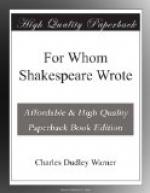The manners of the male population of the period, says Nathan Drake, seem to have been compounded from the characters of the two sovereigns. Like Elizabeth, they are brave, magnanimous, and prudent; and sometimes, like James, they are credulous, curious, and dissipated. The credulity and superstition of the age, and its belief in the supernatural, and the sumptuousness of masques and pageants at the court and in the city, of which we read so much in the old chronicles, are abundantly reflected in the pages of Jonson, Shakespeare, and other writers.
The town was full of public-houses and pleasure-gardens, but, curiously enough, the favorite place of public parading was the middle aisle of St. Paul’s Cathedral—“Paul’s Walk,” as it was called—which was daily frequented by nobles, gentry, perfumed gallants, and ladies, from ten to twelve and three to six o’clock, to talk on business, politics, or pleasure. Hither came, to acquire the fashions, make assignations, arrange for the night’s gaming, or shun the bailiff, the gallant, the gamester, the ladies whose dresses were better than their manners, the stale knight, the captain out of service. Here Falstaff purchased Bardolph. “I bought him,” say’s the knight, “at Paul’s.” The tailors went there to get the fashions of dress, as the gallants did to display them, one suit before dinner and another after. What a study was this varied, mixed, flaunting life, this dance of pleasure and license before the very altar of the church, for the writers of satire, comedy, and tragedy!
But it is not alone town life and court life and the society of the fine folk that is reflected in the English drama and literature of the seventeenth century, and here is another wide difference between it and the French literature of the same period; rural England and the popular life of the country had quite as much to do in giving tone and color to the writings of the time. It is necessary to know rural England to enter into the spirit of this literature, and to appreciate how thoroughly it took hold of life in every phase. Shakespeare knew it well. He drew from life the country gentleman, the squire, the parson, the pedantic schoolmaster who was regarded as half conjurer, the yeoman or farmer, the dairy maids, the sweet English girls, the country louts, shepherds, boors, and fools. How he loved a fool! He had talked with all these persons, and knew their speeches and humors. He had taken part in the country festivals-May Day, Plow Monday, the Sheep Shearing,




